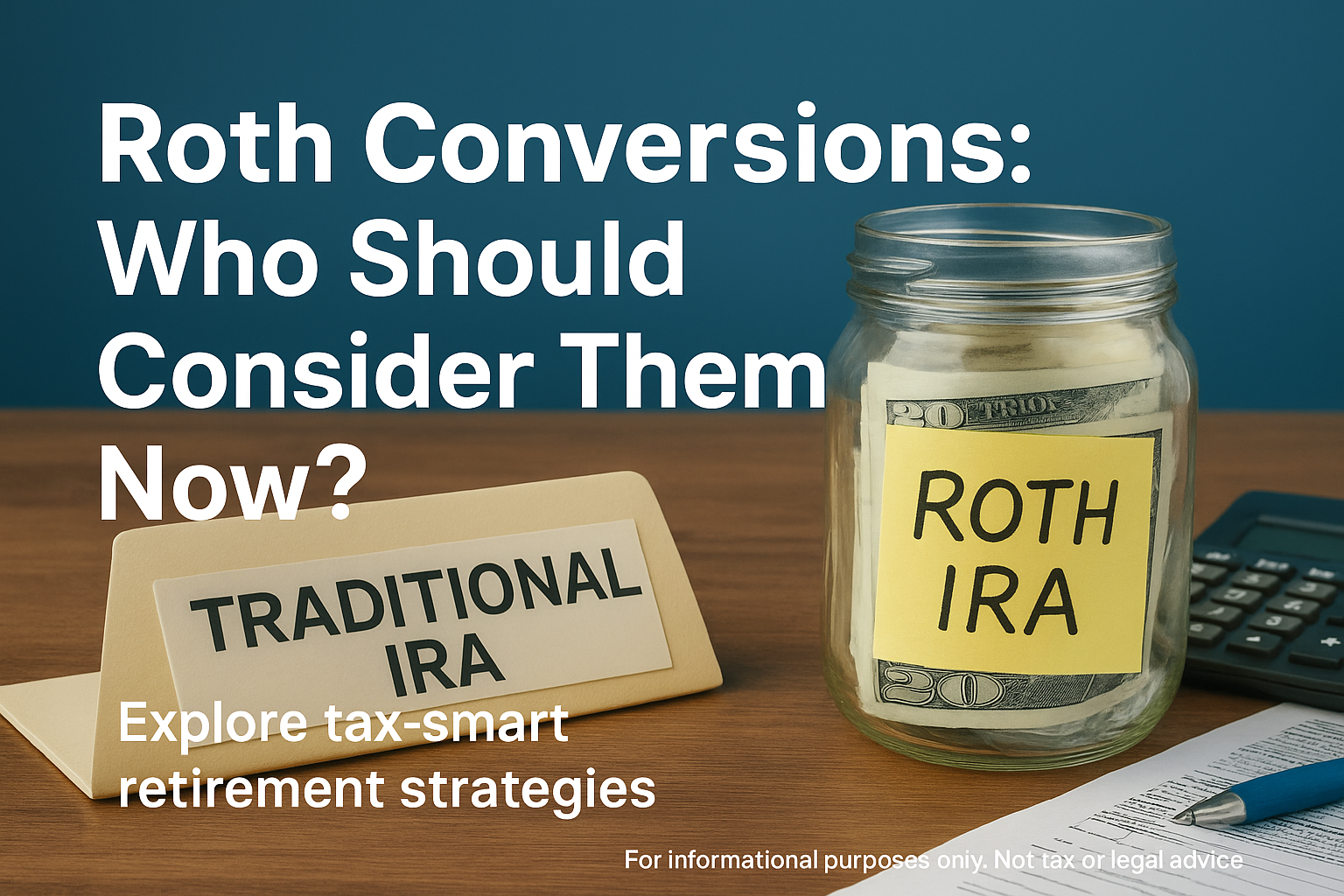Introduction
With the ever-changing landscape of retirement planning, Roth conversions have emerged as a powerful strategy for investors seeking future tax advantages and financial flexibility. You may have heard that converting your traditional IRA or 401(k) to a Roth IRA can lead to benefits down the road and that’s true for many, but is it the right move for you today? In this article, we’ll break down exactly what a Roth conversion is, the mechanics behind it, and, most critically, who should be considering this strategy right now.
What Is a Roth Conversion?
A Roth conversion refers to the process of moving funds from a traditional IRA or qualified employer-sponsored retirement plan (such as a401(k)) into a Roth IRA. In making this switch, you pay income tax on the amount converted now but then enjoy the benefits of tax-free growth potential and tax-free withdrawals in retirement.
How Roth IRAs Differ from Traditional IRAs
- Traditional IRA: Contributions may be tax-deductible, and withdrawals in retirement are taxed as ordinary income.
- Roth IRA: Contributions are made with after-tax dollars, but qualified withdrawals (if you’re at least 59½ and have held the account for five years) are completely tax-free.
Converting to a Roth IRA essentially means you’re choosing to pay taxes today for the potential of zero taxes on withdrawals later.
Why Consider Roth Conversions Now?
Recent market volatility, changes in tax laws, and the possibility of higher taxes in the future have prompted many investors to reexamine the potential advantages of Roth conversions. Here are some compelling reasons:
1. Current Tax Rates Are Historically Low
Federal income tax brackets remain relatively low by historical standards, but there’s no guarantee they’ll stay that way indefinitely. If you believe taxes will rise in the coming years either due to legislation or your own income increasing, paying tax now on a Roth conversion could lock in today’s lower rate.
2. Potential for Market Rebounds
If your retirement account has experienced a decline in value due to market volatility, converting now could mean paying tax on a smaller amount. When the market recovers, all future growth in a Roth IRA will be entirely tax-free.
3. Required Minimum Distributions (RMDs) Do Not Apply to Roth IRAs
Traditional IRAs mandate withdrawals at age 73, regardless of whether you need the funds. Roth IRAs, in contrast, do not require RMDs during your lifetime, giving you greater flexibility in retirement planning.
4. Estate Planning and Inheritance Considerations
A Roth IRA can provide heirs with tax-free withdrawals, often making it a valuable estate planning tool. Roth IRAs also allow you to pass on wealth without saddling beneficiaries with significant income taxes.
Who Should Consider Roth Conversions Now?
Not everyone benefits equally from a Roth conversion. Below, we’ll identify the groups who may see the greatest advantages.
Individuals Expecting Higher Future Tax Rates
- If you anticipate increased income or foresee higher federal and state tax rates, a Roth conversion can allow you to pay taxes at a lower rate today.
- Younger investors with years of career growth ahead, or anyone planning to sell a business or asset at a substantial profit, fit into this category.
Those in Low-Income Years
Converting during a year when your income is low (due to retirement, job loss, or other circumstances) could mean you pay much less in taxes.
- Retirees before RMD age often have a gap between retirement and the start of Social Security or RMDs, making these years ideal for conversions.
- Individuals temporarily out of the workforce (e.g., caring for family, returning to school) may benefit from lower tax rates.
Investors with Depressed Account Values
Market declines hand investors an unusual opportunity—converting assets after a downturn lets you pay less tax while setting up your account to grow tax-free during potential market rebounds.
Savvy Estate Planners
If you wish to maximize what you leave behind to heirs, a Roth conversion can be particularly valuable. Heirs won’t have to pay income tax on inherited Roth IRA assets, potentially saving more money for your family.
Who Might Want to Avoid a Roth Conversion?
Though Roth conversions offer appealing benefits, they are not always the best move. Here’s who should exercise caution:
Those Who Can’t Afford to Pay the Taxes Now
Roth conversions require that you pay ordinary income taxes on the converted amount. If you lack the cash outside of your IRA to pay these taxes, the move could be counterproductive.
Individuals Close to Retirement in High Tax Brackets
If you’re nearing retirement and already in a high tax bracket, converting now could mean a significant tax hit. It may be better to wait for a lower-income year or avoid conversion altogether.
People Expecting to be in a Lower Tax Bracket in Retirement
If you anticipate your tax rate dropping significantly once retired, the immediate tax cost of converting may outweigh the future tax savings.
The Mechanics of Doing a Roth Conversion
If you’ve decided that a Roth conversion makes sense for you, here are the steps to follow:
1. Decide How Much to Convert
It isn’t all-or-nothing—you can convert part or all of your account. Many choose to “ladder” conversions over several years to avoid bumping into higher tax brackets.
2. Plan for the Tax Payment
Have a strategy for paying the conversion taxes. Using funds outside your retirement accounts can preserve money for tax-free growth.
3. Initiate the Conversion
Contact your IRA or 401(k) provider to move the funds. This is generally a straightforward process but should be done with care to avoid unintended tax consequences.
4. Report the Conversion Properly
You must report the conversion on your federal tax return. It will be included as income in the year you execute the conversion.
Common Roth Conversion Strategies
Here are a few popular considerations to help maximize the value of Roth conversions:
- Partial Conversions Over Time: Rather than converting all at once, spread conversions over several years to stay within lower tax brackets.
- Strategic Timing: Convert during years of low income, after market declines, or before receiving large windfalls.
- Tax Bracket Management: Calculate how much to convert to avoid jumping into a higher tax bracket.
Points to Consider Before Converting
Before you initiate a Roth conversion, keep these factors in mind:
- The amount of additional income a conversion will generate for tax purposes
- The ability to pay the taxes without dipping into retirement savings
- Present and future state income taxes, as not all states tax retirement income the same way
- Any impacts on financial aid eligibility, Medicare premiums, or tax credits, since increased income in the conversion year may affect these items
Conclusion
Roth conversions offer a compelling, flexible tool that aims to help investors who want to minimize taxes, maximize retirement savings, and leave a legacy. However, the strategy is not one-size-fits-all. Factors such as your current and future tax situation, financial goals, account values, and estate planning objectives should all play a role in your decision. If you’re considering a Roth conversion, speak with a competent financial advisor or tax professional to ensure it fits your overall plan. By taking a proactive, thoughtful approach, you can position yourself to use your retirement savings more efficiently, today and in the years ahead.
Sources
- IRS - Topic No. 309 Roth IRAs
- Congressional Research Service - Federal Individual Income Tax Rates History
- Forbes - Should You Convert Your IRA To A Roth During A Market Downturn?
- Fidelity - Roth IRA Required Minimum Distributions
- The Balance - Roth IRA Inheritance Rules
- Investopedia - Factors to Consider Before Doing a Roth Conversion
Throughout this article, citations refer to these numbered sources.
Disclosures:
Provided content is for overview and informational purposes only and is not intended and should not be relied upon as individualized tax, legal, fiduciary, or investment advice. Investing involves risk which includes potential loss of principal. Past performance is not a guarantee of future results. The use of asset allocation or diversification does not assure a profit or guarantee against a loss. Upon clicking third-party external links, you will access content that is not controlled, reviewed or approved by, and is not the responsibility of, the entities and individuals who provided the content you are leaving.
Neither the companies of OneAmerica Financial, Fuller Financial, nor their representatives provide tax or legal advice. For answers to specific questions and before making any decisions, please consult a qualified attorney or tax advisor.
.svg)



